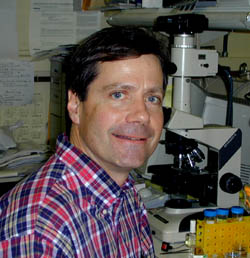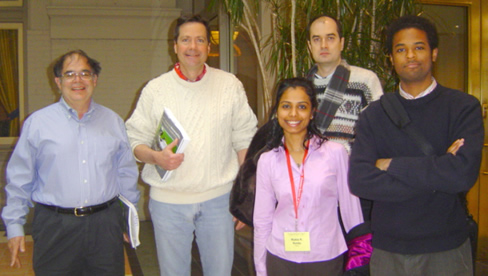| |
| |
| Ward F. Odenwald, Ph.D., Investigator |
 |
Dr. Odenwald received his Ph.D. degree in Biology from Johns Hopkins University. His postdoctoral work on the functional analysis of the murine homeobox gene Hox A.5 was carried out in the laboratory of Robert Lazzerini at the NINDS. In 1990, he established the Neurogenetics Unit in the Laboratory of Neurochemistry, NINDS, where he has pursued the identification and functional analysis of neuronal-identity networks that control stem cell lineage development in the CNS. Dr. Odenwald's laboratory is currently studying the role of transcription factor regulatory networks that participate in the temporal development of Drosophila CNS ganglia.
|

|
Staff:

Research Interests:
In a developing nervous system, the precise timing of cell fate decisions is most likely under the combinatorial control of cell-extrinsic and cell-intrinsic regulatory inputs. To understand how these orchestrated events collectively produce a functioning nervous system it is necessary to characterize the genetic circuitry underlying the patterning of cell fate determining events. Given the remarkable gene conservation observed among all metazoa, we believe that understanding the molecular details of Drosophila CNS lineage development will have broad implications for vertebrate neurogenesis. Our studies on Drosophila CNS patterning reveal that there exists a cell-identity regulatory network that acts temporally during the development of all CNS ganglia. We have discovered that during neuroblast (NB) lineage formation most NBs undergo sequential transitions in the expression of a set of transcription factors: As a result sequentially formed first- to last-born neuronal subpopulations arise that are marked by the expression of one of these factors. Given the global nature of this regulatory cascade, we hypothesize that these expression domains represent fundamental branch points in a genetic circuit controlling temporally sensitive steps in the development of all CNS ganglia.
We have initiated a search for targets of the temporal network by taking a candidate gene approach based on presence of conserved sequences in the promoters of CNS determinants and other uncharacterized genes. Multiple approaches for in silico promoter analysis are being used, including a newly developed software (EvoPrinter) for identification of cis-regulatory elements.
Our efforts are directed at understanding the molecular events that control cell-identity decisions during CNS development. We have identified Nerfin-1 a conserved Zn-finger protein, with vertebrate cognates. We have generated recessive lethal null mutations in nerfin-1 by homologous recombination and have discovered that axon pathfinding in mutant embryos is severely disrupted. We are currently exploring nerfin-1 gene regulation.
|
Selected Recent Publications:
Brody, T., Rasband, W., Baler, K., Kuzin, A., Kundu, M. and Odenwald W. F. (2008) Sequence conservation and combinatorial complexity of Drosophila neural precursor cell enhancers., BMC Genomics 9, R371.
Full Text/Abstract
Yavatkar A. S., Lin Y., Ross, J., Fann Y., Brody T. and Odenwald W. F. (2008) Rapid detection and curation of conserved DNA via enhanced-BLAT and EvoPrinterHD analysis., BMC Genomics 9, 106-118.
Full Text/Abstract
Kuzin A, Kundu M, Brody T, Odenwald WF (2007) The Drosophila nerfin-1 mRNA requires multiple microRNAs to regulate its spatial and temporal translation dynamics in the developing nervous system, Developmental Biology 310, 35-43.
Full Text/Abstract
Brody T, Rasband W, Baler K, Kuzin A, Kundu M, Odenwald WF (2007) cis-Decoder discovers constellations of conserved DNA sequences shared among tissue-specific enhancers, Genome Biol 8(5):R75.
Full Text/Abstract
Brody T, Odenwald WF (2005) Regulation of temporal identities during Drosophila neuroblast lineage development, Curr Opin Cell Biol 17(6), 672-5.
Full Text/Abstract
Odenwald WF, Rasband W, Kuzin A, Brody T (2005) EVOPRINTER, a multigenomic comparative tool for rapid identification of functionally important DNA, Proc Natl Acad Sci 102, 14700-5.
Full Text/Abstract
Odenwald WF. (2005) Changing fates on the road to neuronal diversity, Dev Cell 8(2), 133-4.
Full Text/Abstract
All Selected Publications
Contact Information:
Dr. Ward F. Odenwald
Neural Cell-Fate Determinants Section, NINDS
Porter Neuroscience Research Center
Building 35, Room 1B-1014
35 Convent Drive, MSC 4130
Bethesda, MD 20892-4130
Telephone: (301) 402-1657 (office),
(301) 496-5940 (laboratory),
(301) 496-1339 (fax)
Email: odenwaldw@ninds.nih.gov
|
|















